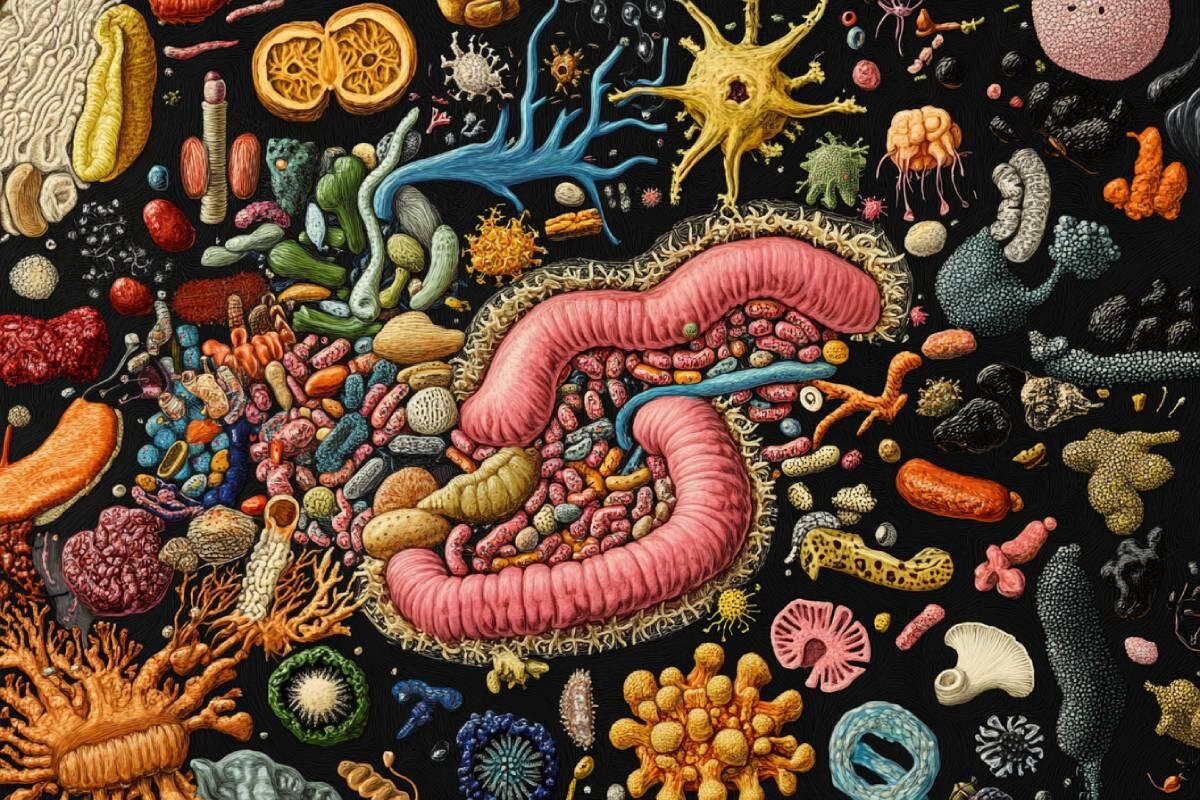What Is Gut Microbiota and How Can It Transform Your Health?
In recent years, interest in gut microbiota has grown exponentially, especially in the context of how it affects our physical and mental health.
Gut microbiota, also known as gut flora, is composed of trillions of microorganisms, including bacteria, fungi, viruses, and other microbes that inhabit the human gastrointestinal tract.
This complex ecosystem plays a fundamental role in various bodily functions, from digesting food to strengthening the immune system. An imbalance in gut microbiota can lead to several health problems, such as obesity and metabolic diseases.
What Is Gut Microbiota?
The gut microbiota refers to the microorganisms that live in the human intestine. Although they are invisible to the naked eye, these microorganisms are essential for maintaining the body's balance.
They help to:
✔ Digest food that is not fully processed by the body's enzymes.
✔ Produce essential substances, such as vitamins and short-chain fatty acids.
✔ Strengthen the immune system, protecting the body against pathogens.
It is estimated that the number of bacterial cells in the human body exceeds the number of human cells, with most of these bacteria located in the intestine.
Each person has a unique microbiota, influenced by factors such as genetics, diet, age, environment, and medication use.
However, scientific studies indicate that although gut microbiota is a natural part of the human body, its composition and balance significantly impact overall health.
How Gut Microbiota Influences Health
Gut microbiota does more than just aid digestion—it plays a crucial role in various other bodily functions.
1. Immune System Function
✔ Approximately 70% of the immune system is located in the gut.
✔ Gut bacteria help maintain the intestinal barrier intact and prevent pathogen invasion.
✔ The microbiota teaches the immune system to distinguish between pathogens and the body’s own cells, preventing autoimmune diseases.
2. Metabolic Regulation
✔ The microbiota plays a role in regulating metabolism and controlling body weight.
✔ Certain gut bacteria influence how the body stores fat and uses energy.
✔ An imbalance in microbiota (dysbiosis) may be linked to obesity, type 2 diabetes, and metabolic syndrome.
3. Mental Health and the Gut-Brain Axis
✔ The gut-brain axis is a communication pathway between the gut and the brain.
✔ Gut microbiota produces neurotransmitters and hormones, such as serotonin (90% of which is produced in the gut).
✔ Imbalances in microbiota may be linked to depression, anxiety, and neurological disorders.
4. Prevention and Treatment of Chronic Diseases
✔ Gut microbiota influences inflammatory bowel diseases, such as Crohn’s disease and ulcerative colitis.
✔ Dysbiosis may be linked to cardiovascular diseases, cancer, and neurodegenerative diseases such as Alzheimer’s and Parkinson’s.
✔ Maintaining a balanced microbiota helps reduce inflammation and improve overall health.
How to Improve Your Gut Microbiota
Now that we know how gut microbiota influences our health, it’s essential to understand how to take care of it to improve our quality of life.
1. Balanced Diet
✔ Eat fiber-rich foods, such as fruits, vegetables, whole grains, and legumes.
✔ Foods rich in prebiotics (bananas, garlic, onions, oats) and probiotics (yogurt, kefir, sauerkraut) help balance microbiota.
✔ These foods stimulate the production of short-chain fatty acids, strengthening the intestinal barrier.
2. Stress Reduction
✔ Chronic stress alters microbiota and increases inflammation in the body.
✔ Practices like meditation, yoga, and physical exercise help maintain a healthy gut.
3. Responsible Use of Antibiotics
✔ Antibiotics are essential, but their overuse can eliminate beneficial gut bacteria.
✔ Always follow medical guidance and avoid self-medication.
4. Avoid Excessive Consumption of Processed Foods
✔ Ultra-processed foods high in sugars and trans fats harm microbiota and increase inflammation.
✔ Choose fresh and natural foods to maintain gut balance.
5. Regular Physical Exercise
✔ Regular physical activity increases gut microbiota diversity.
✔ Exercise enhances immunity, reduces inflammation, and promotes mental well-being.
Conclusion
The gut microbiota plays a key role in health, influencing everything from digestion to preventing chronic diseases.
✔ Maintaining a balance between beneficial bacteria in the gut is essential for proper body function.
✔ Habits such as a balanced diet, stress control, responsible use of antibiotics, and physical exercise help maintain a healthy microbiota.
By understanding the importance of this "invisible community" living inside our bodies, we can take measures to improve our health from the inside out.
📌 Incorporating healthy habits not only improves quality of life but also prevents diseases and promotes overall well-being.
